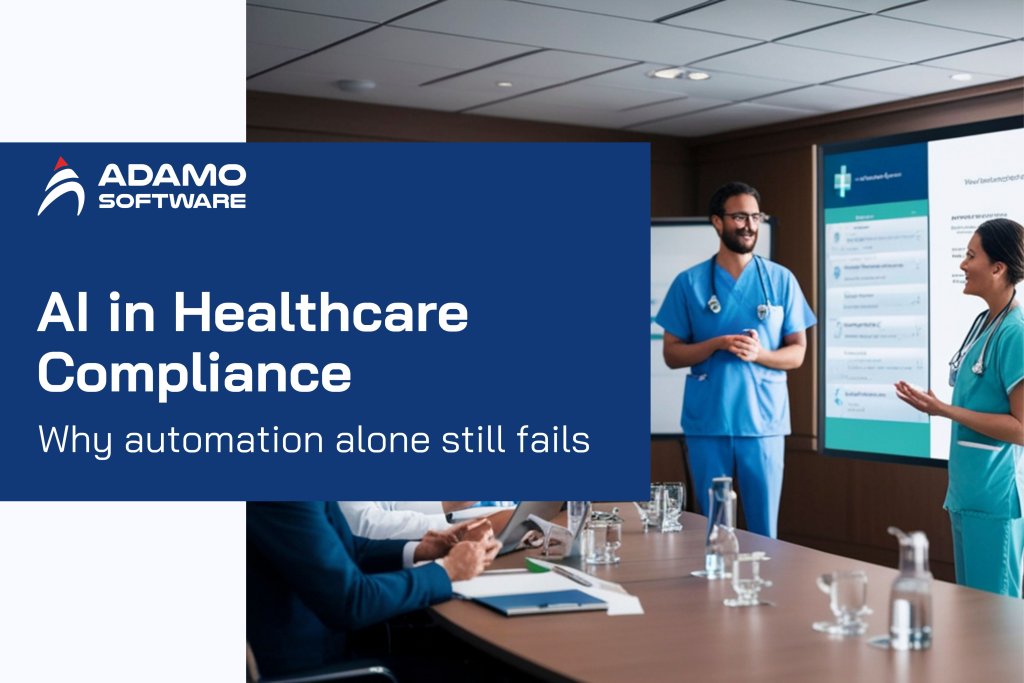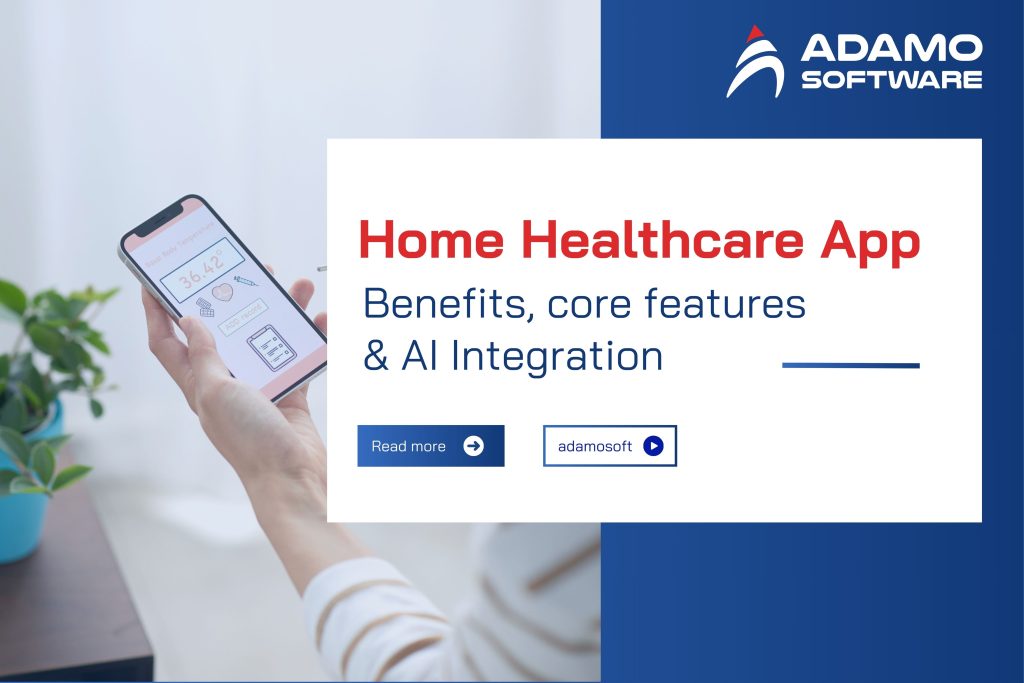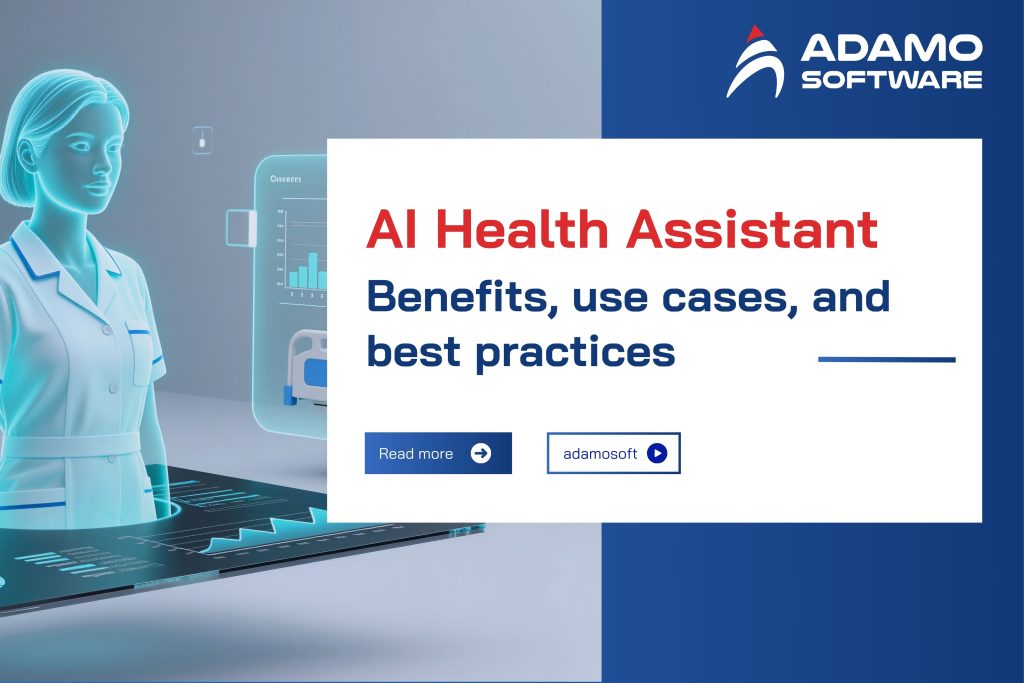What is healthcare CRM? Practical uses of CRM in healthcare industry
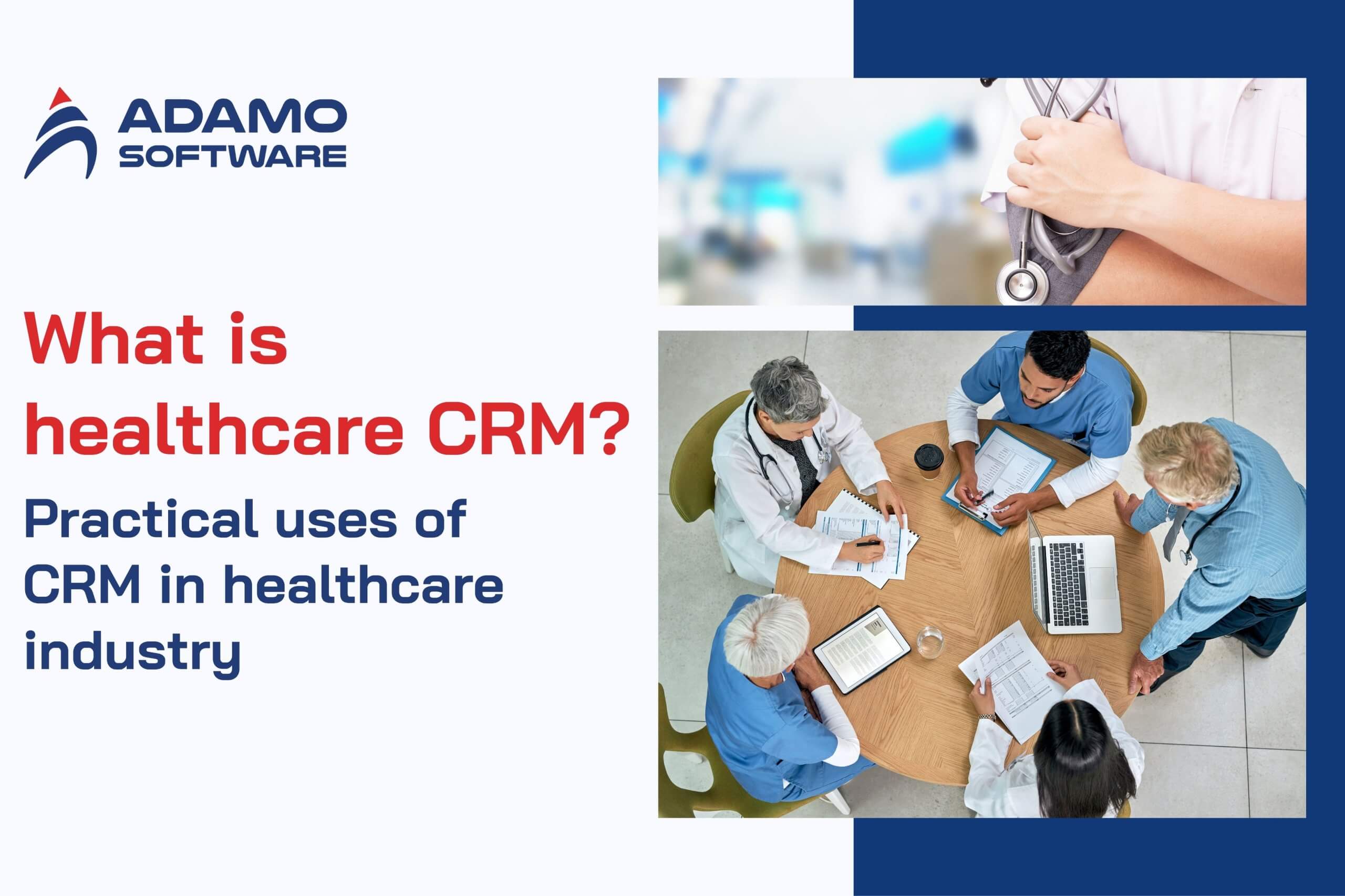
The healthcare industry is facing a pressing challenge: overburdened and exhausted staff struggle to provide the attention, understanding, and care patients deserve. This strain affects the quality of care and can significantly harm an organization’s reputation.
This is when healthcare CRM (Customer Relationship Management) solutions come into play. These systems are becoming increasingly popular as they empower healthcare providers to build stronger, more personalized patient relationships. Investing in a healthcare CRM allows organizations to comprehensively view each patient’s medical history, payment records, and behavior patterns.
This guide will explore what is healthcare CRM and how healthcare CRMs can transform your organization by streamlining administrative tasks and optimizing patient care processes.
I. What is healthcare CRM?
What is a healthcare CRM system? Simply put, it is a solution tailored for any healthcare organization, such as hospitals, laboratories, medical centers, public or private clinics, etc. Your healthcare CRM allows you to track best practices in customer management and update customer data (medical history, visits, medical bills, etc.). You can also set up an online healthcare portal to create and track medical appointments. Healthcare CRM can provide useful reports and metrics to analyze your clinic’s daily work.
II. Healthcare CRM vs EHR: Key differences
| Elements | Healthcare CRM | EHR |
| Stands for | Customer (Patient) Relationship Management | Electronic Health Record |
| HIPAA compliance | Software like LeadSquared Healthcare CRM is required to be HIPAA-compliant. | Compliance is essential. However, not all software is HIPAA compliant. Many professionals have had to pay fines for HIPAA violations and breaches. |
| Purpose | This software manages patient relationships, schedules appointments, and automates hospital workflows. | EHR stores patient medical history in digital form. The patient’s medical history is maintained by the healthcare provider over time. It can be shared with authorized providers and personnel from multiple organizations. |
| Benefits for Hospitals/Clinics | Healthcare CRM enables automated information capture, distribution, personalized patient communication, appointment scheduling, 360-degree patient view, and easy-to-access information. | EHR systems provide faster access to patients’ medical histories, which can be shared. |
| Benefits for Patients | Improve patient communication. Consistent and personalized from hospital and clinic. | Patients do not need to carry traditional health records when visiting specialists or switching providers. |
| Top software solutions | LeadSquared HIPAA compliant healthcare CRM | Epic, EClinicalWorks, DrChrono, NextGen, WebPT |
Those are the key differences between healthcare CRM and EHR systems. However, you should note that both software systems serve a specific purpose. For example, an EHR system can help improve the quality of care and patient outcomes by allowing access to and sharing of medical records across organizations,
On the other hand, healthcare CRM allows you to capture claims, engage with patients, and reduce staff turnover.
However, many healthcare organizations are still skeptical about using software tools because:
- The tools they know may not be HIPAA-compliant
- They have yet to find software to support most of their operations.
III. What is the use of CRM software in the healthcare industry?
Understanding what is healthcare CRM helps you effectively attract, secure, and retain patients. You should manage your current patients before they visit the hospital for follow-up check-ups.
Here is a simple example. A patient calls your healthcare organization’s call center to inquire about a medical appointment. If the treatment comes with a few prerequisites before the first appointment, the healthcare CRM will send them the prerequisites they must comply with before the appointment.
Understanding what is healthcare CRM also helps you effectively attract, secure, and retain patients. You should manage your current patients before and after they visit the hospital for follow-up check-ups.
Here is a simple example. A patient calls your healthcare organization’s call center to inquire about a medical appointment. If the treatment comes with a few prerequisites before the first appointment, the healthcare CRM will send them the requirements they must comply with before the appointment.
When they make their first appointment, the healthcare CRM will send an automated email containing details about their treatment. The automated email can contain what the patient should follow during the treatment.
CRM software is used in healthcare; here are some ways CRM solutions play a role in healthcare.
- Comprehensive Patient Management: A hospital or healthcare organization will encounter patients with different health issues and need different care levels. So, it takes work to manage everything manually. However, patient relationship management in healthcare makes things easier, especially in storing information and providing a comprehensive overview of their appointments, medical history, etc. CRM in healthcare will help customize your patient management plans so that your patients get the care they need.
- Multi-Departmental Collaboration: A private practice or hospital will have multiple departments. These departments need to collaborate and interact with each other to provide the best patient experience. However, each team may be busy, leading to overlapping tasks. With healthcare CRM solutions, all departments in your healthcare organization can share data seamlessly and quickly.
- Reporting & Analysis: Analyzing healthcare data is crucial in running a healthcare organization. Therefore, healthcare providers should know which areas must be worked on to provide better patient care. Knowing what is healthcare CRM, you can compile reports and analyze them. Such reports include patient complaints or requests, internal issues, referrals, etc.
You can explore more about Hospital Management Systems: Types, Key Features & Must-Know Insights here.
IV. Practical uses of CRM in healthcare industry
Let me walk you through the benefits hospitals and clinics can reap using a CRM platform:
1. Build a 360-degree patient profile to manage patient relationships effectively. We all know about the iconic
Apple brand and its CEO, Steve Jobs, said, “Get closer to your customers than ever before. So close that you need to tell them what they need before they know it themselves.” You get closer to your patients through CRM by tapping into information from multiple data sources. Access patient demographics, social profiles, behavioral data (activity tracking, conversation tracking – phone calls, emails, text messages, and walk-ins), medical history, and appointment schedules (provided by them and pulled from your other tools). Understanding what is healthcare CRM, you can build detailed patient profiles and foster long-term relationships with patients. This helps personalize and connect with your customers through emails, text messages, remarketing campaigns, phone calls, etc.
2. Collect requests and segment them intelligently
To be able to connect with your patients without any friction, you need to engage with them on a personal level. You must be able to deliver all appointments and other requests based on their location, condition, doctor, preferences, past diagnoses, health language, specific ailments, etc.
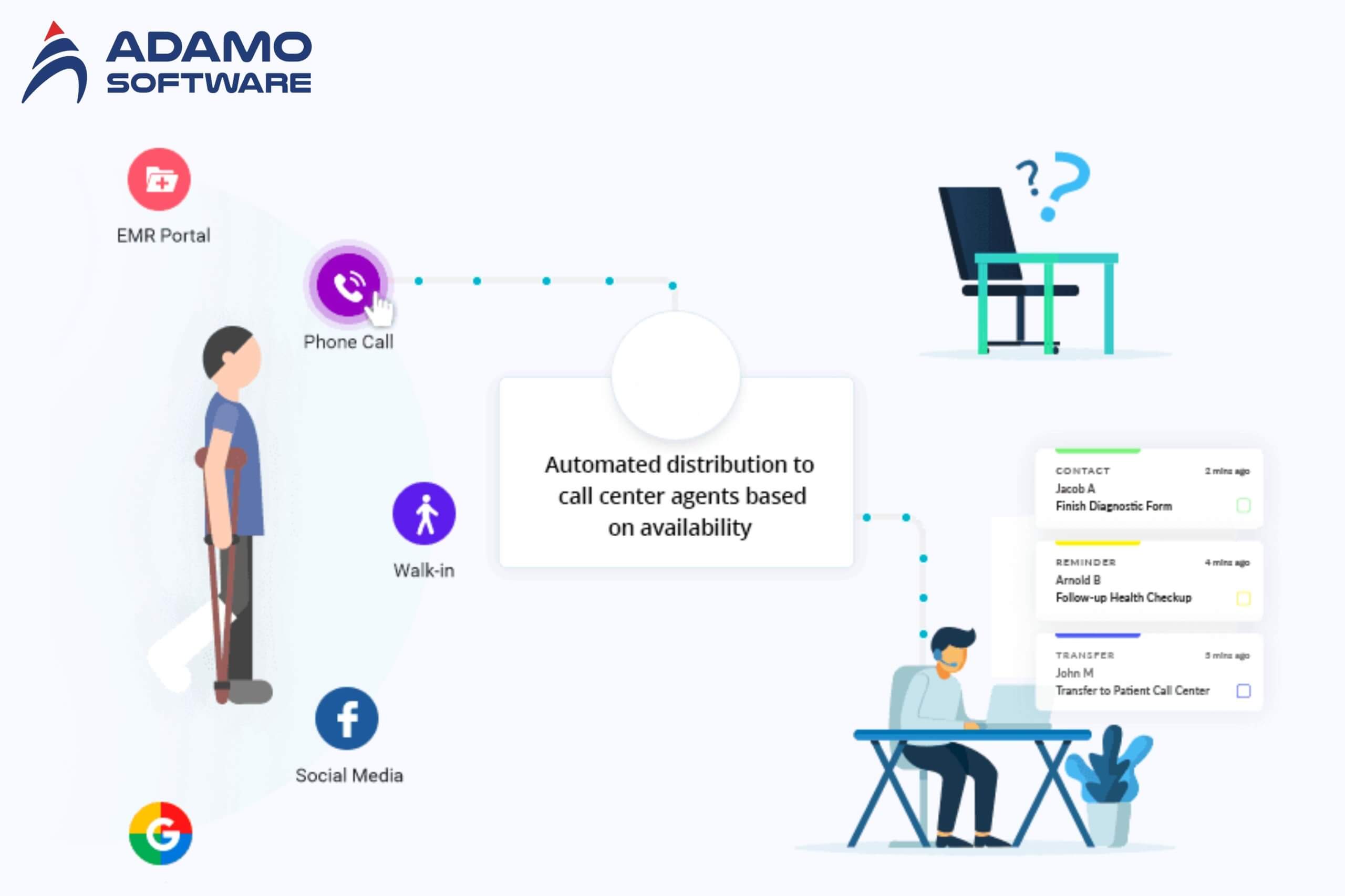
Personalization according to customer requests is the first step to building a seamless relationship. Yes, personalized communication is important, but when it comes to healthcare, time is even more valuable. There is an urgent need to reduce wait times (in every interaction) and time spent in limbo. A smart healthcare CRM will help you instantly connect your patients with the right doctor. It will support your patient engagement efforts. This is one of the biggest benefits of CRM software for the healthcare industry.
3. Organize family members as a unit
Did you know that family medical history is the strongest factor in identifying people at higher risk of common disorders such as heart disease, high blood pressure, stroke, certain cancers, and diabetes? Genetic factors, environmental conditions, and lifestyle choices influence these complex diseases. With a smart healthcare CRM, you can unite family members as a unit through account management. Healthcare CRM software makes it easier to manage patient relationships, organize appointments, and analyze data to enhance customer service.
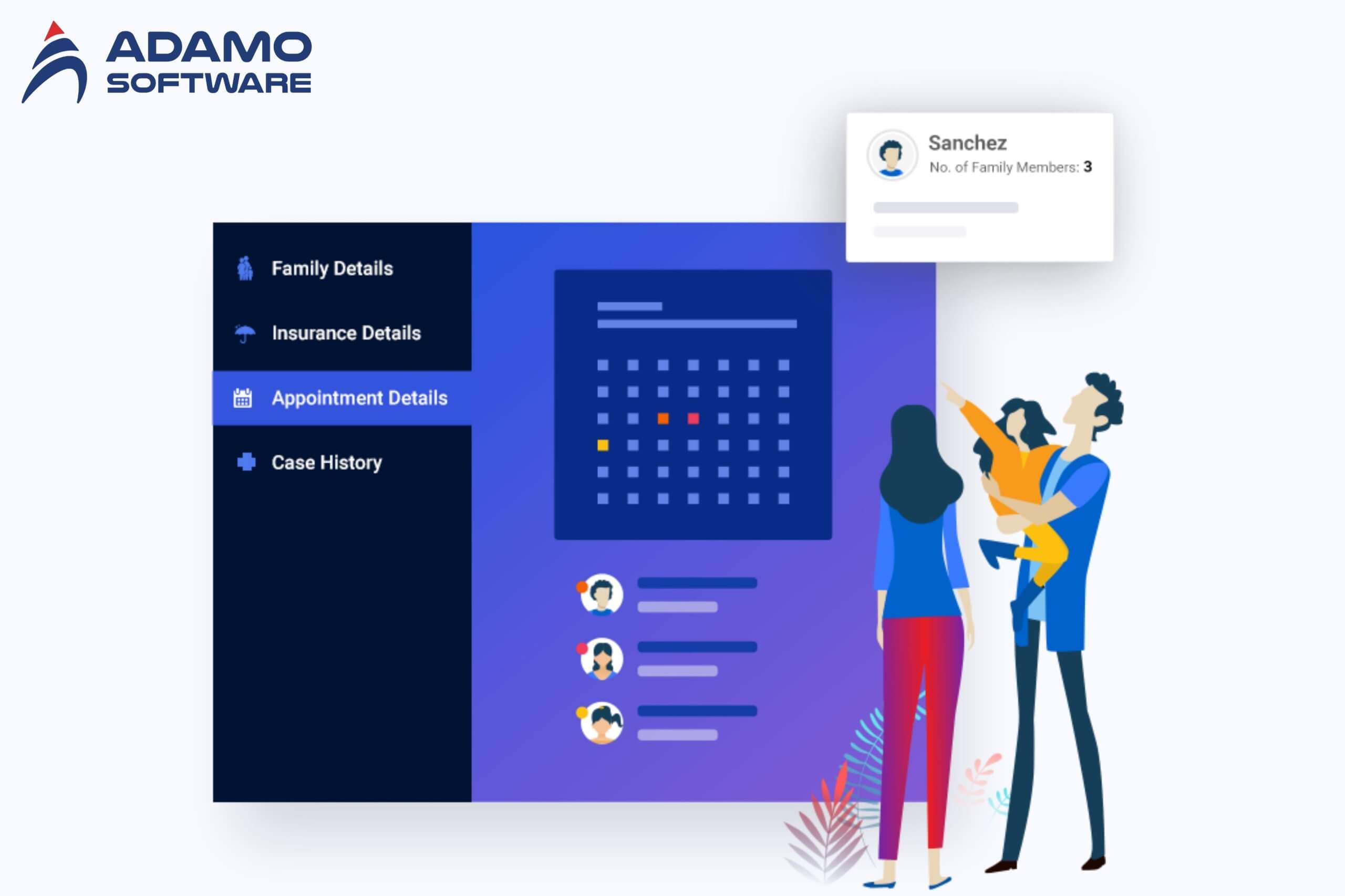
This will help you track patient history at your hospital, family history of genetic diseases, and appointment history of all family members, and accordingly provide relevant health information, loyalty points, and rewards.
4. Personalize patient communication
Patients contact their healthcare organization, believing they will receive a solution. However, when we discuss the large number of patient inquiries daily, providing personal attention to everyone is a big challenge. Tracking patient activities, their conditions, and many other parameters is beyond the scope of an Excel spreadsheet. That is where healthcare CRM systems come into play. This system helps keep track of every patient by providing a clear view of the entire patient journey right from the moment their inquiry is registered. Patients want a comprehensive view of their healthcare history and expect their in-person visits to reflect that. With a CRM, you can customize emails and text messages to share prescriptions, precautions, reports, or even make follow-up calls. It can help you humanize your hospital and build a positive relationship with your patients by engaging them with a great CRM system.
5. Provide a hassle-free medical experience
When you call back your patients to schedule an appointment, you need to have their detailed history, previous treatments, previous doctors, family history, medication history, etc. A proper tab on previous medications can help your doctor prescribe future medications. For example, if a patient has diabetes and comes in for a full body check-up, it would be beneficial to know the drugs and treatments the patient has previously taken to know whether to increase the dosage or change the medication. CRM solutions fully meet customer requirements by analyzing, organizing, and segmenting patient data, improving patient-doctor interactions, and ensuring regulatory compliance.
6. Anticipate patient needs
You must anticipate patients’ needs based on their activities, medical and family history, and relevant conditions and deliver exactly what they expect. Integrating healthcare CRM solutions with modern systems can automate tasks like appointment reminders and improve patient engagement through features like online scheduling and patient portals.
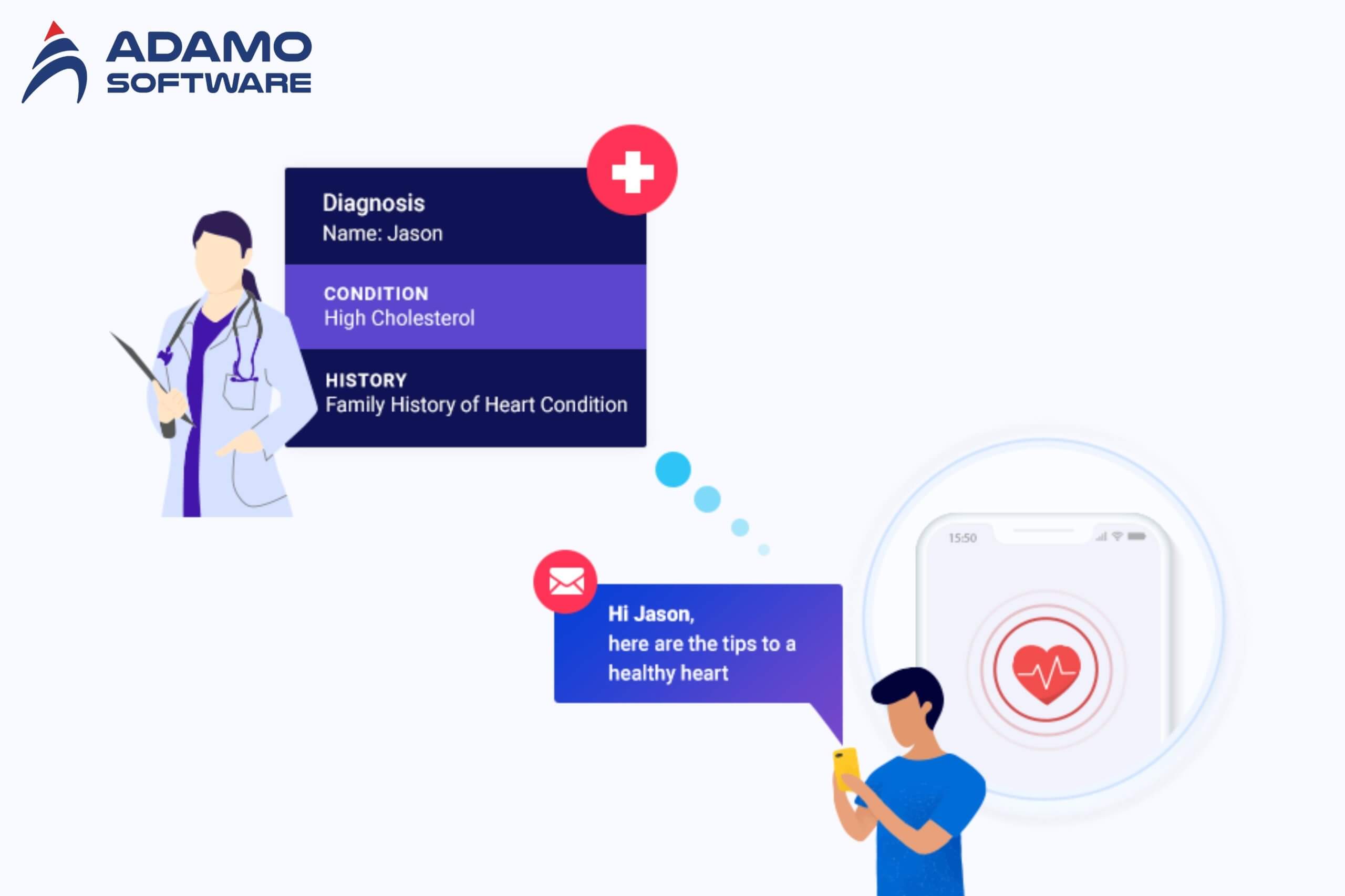
This will help retain patients by assisting them to minimize conditions and potentially prevent them before they occur. Proactively managing health conditions helps foster better patient relationships. You can send additional automated emails and SMS messages about their prescriptions and health. This will show your organization cares about patients, which will build brand loyalty.
7. Automate Appointment
Scheduling You should be able to schedule appointments without any hassle. Healthcare CRM systems can even automate appointments based on Clinic Location Treatment Requests, Physician Specialties, and Patient Preferences. You should also be able to sync appointments, making it easy for doctors and care managers to schedule them. Notifications should be sent to doctors and care managers in case of any changes or cancellations to ensure prompt action.
8. Connect Patients and Doctors Quickly and Seamlessly
When did you last book an Uber and wait 15 minutes for it to arrive? In my opinion, never. And why? People don’t want to wait that long when they have a faster alternative. You always want to save time .The same thing applies to healthcare, only here, every minute counts (literally). But with a healthcare CRM, you can route patients to the doctor of their choice or the doctor who best matches their requirements in terms of specialty, location, doctor’s condition, medical history, and any other parameters you see fit. The distribution happens automatically as soon as a patient’s request is made. You can route calls to your call center agents based on language, urgency, previous diagnoses, etc. This saves your care manager time and ensures faster patient response. A healthcare CRM simplifies communication, ensures HIPAA compliance, and supports personalized care, enhancing the patient experience as a whole.
9. Automatically collect patient feedback
The most important part of any business is gathering input to improve itself. Healthcare CRM allows you to automate patient feedback collection after appointments, streamlining the process with ease. This will help you evaluate the quality of your services, doctors, and facilities and win back those difficult patients. You can automate the process further by sending them emails or text messages to fill out feedback and review forms.
10. Reduce errors with smart healthcare CRM software
Can you imagine a small manual error or miscommunication in the healthcare segment? This will tarnish your public image and leave a negative impact on the patient and their family. Healthcare CRM makes it easy to automate information exchange with other care tools, ensuring communication is always up-to-date.
11. Enhance patient experience through patient engagement
Automated healthcare CRM systems help your organization run smoothly and efficiently, without any disruptions. Ensure optimal waiting times and no last-minute cancellations, thus ensuring a high-quality patient experience with healthcare CRM software. Maintain complete transparency and notify patients instantly whenever a doctor’s schedule is updated to avoid confusion. You can send prescriptions and reports via email or SMS. Healthcare CRM makes these tasks easy for you.
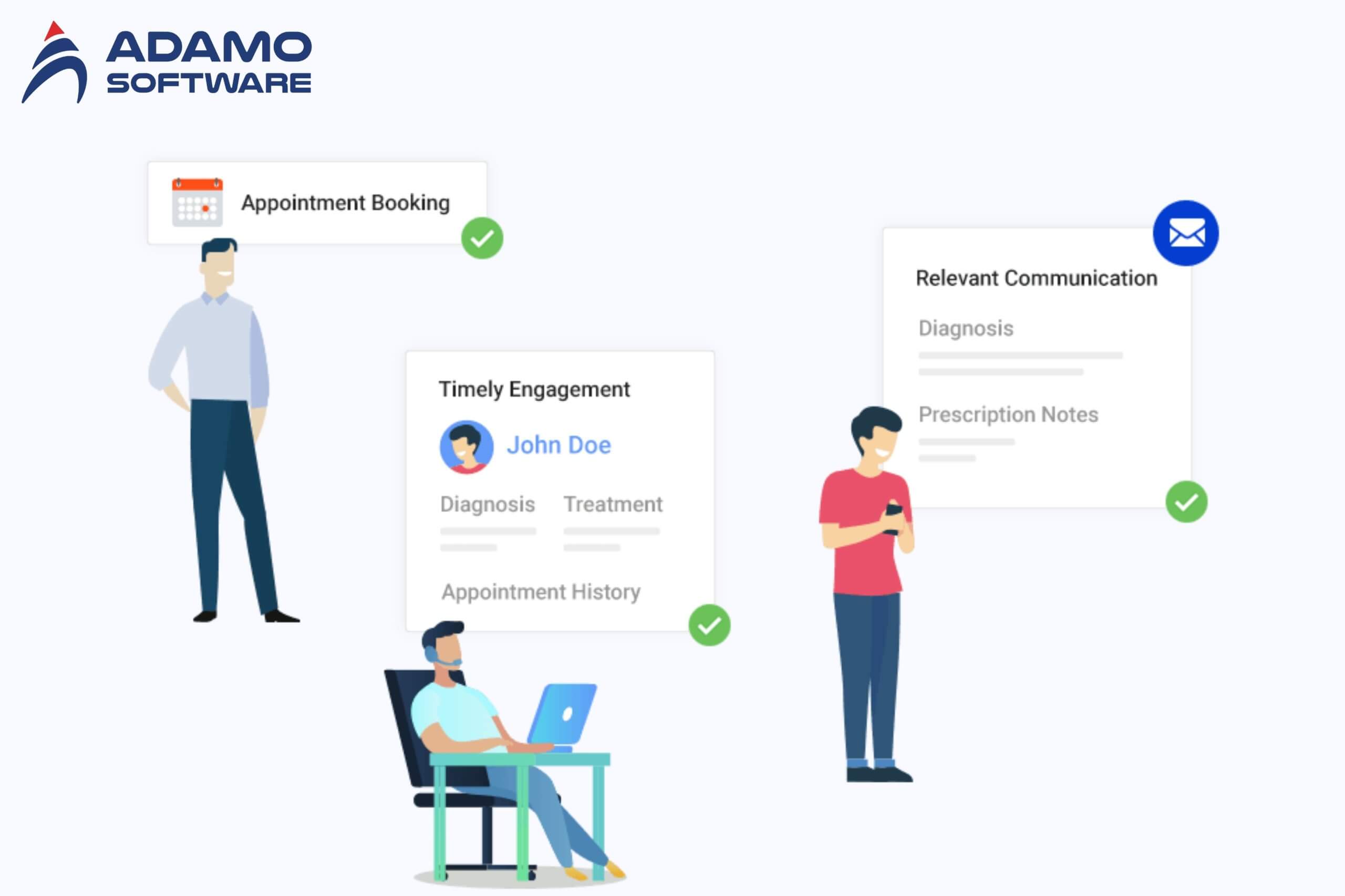
12. Improve your hospital’s bottom line with actionable reports
You’ll be able to reduce your patient acquisition advertising costs and increase operational efficiency by generating revenue allocation reports through Campaigns by the sales team, department, and physician Team performance reports for agents and departments’ Patient satisfaction reports. A reliable healthcare CRM solution lets you track leads and their progress, making follow-ups simpler and more efficient.
An integrated system with mobile apps, email and SMS automation, location tracking, sales automation, and real-time analytics will significantly increase your lead-to-customer ratio and team productivity.
V. Why Adamo Software is the top choice for healthcare CRM solutions
Adamo Software stands out as the top choice for healthcare CRM solutions due to its expertise in providing custom-built, secure, and scalable CRM systems. Adamo’s experienced team uses cutting-edge healthcare technologies to enhance patient management, streamline communication, and improve overall quality of care.

We understand the complexities of the healthcare industry, ensuring that your CRM not only meets compliance standards like HIPAA, but also improves operational efficiency. By choosing Adamo, you benefit from customized solutions that prioritize patient satisfaction while optimizing workflows. Let us help you transform your healthcare business with a CRM built for success.
FAQs
1. What is Healthcare CRM Software?
Healthcare CRM (Customer Relationship Management) software is designed to manage patient interactions and streamline healthcare processes. It acts as a hub for patient clinical and non-clinical data. It provides healthcare professionals with seamless, connected access to a single source of information and a 360-degree view.
2. What are the key features of healthcare CRM?
Healthcare CRM involves managing patient information, facilitating communication, and automating workflows to enhance engagement and efficiency. These features help improve patient relationships, manage data effectively, and streamline communication. It enhances patient engagement and satisfaction and increases efficiency.
3. How does healthcare CRM enhance patient relationships?
Healthcare CRM software fosters closer patient-provider relationships. It facilitates personalized communication and tailored experiences. It allows healthcare professionals to quickly understand patient preferences and needs, medical history, and treatment plans, enabling more efficient and personalized care.
4. Why is effective data management important in a healthcare CRM platform?
Effective data management in healthcare CRM software ensures easy access to accurate patient details while safeguarding privacy and security, giving healthcare providers the tools they need to manage patient information efficiently. This helps healthcare providers make informed decisions. It also provides personalized care and ensures continuity of care across multiple touchpoints.
5. How does healthcare software streamline communication?
Healthcare CRM integrates communication tools that help you simplify effective coordination between healthcare teams. These tools enable secure messaging, appointment scheduling, and efficient task management. Ensure timely patient care and improve collaboration between healthcare professionals.
7. How can healthcare CRM improve patient engagement and satisfaction?
Healthcare CRM enhances patient engagement, interaction, and satisfaction through personalized interactions and proactive outreach. It enables healthcare providers to understand patient needs and preferences. It responds to requests promptly so appropriate care plans can be provided.
8. How does healthcare CRM software increase efficiency in healthcare operations?
Healthcare CRM automates repetitive tasks and optimizes workflows, saving valuable time for patient care. It also streamlines resource allocation and scheduling, improves team collaboration, and reduces administrative burdens. This enables healthcare providers to concentrate on providing outstanding patient care.
9. What are the best practices for integrating a CRM with a home care website?
- Define clear goals
Decide what needs to sync: referrals, bookings, client records, care plans, or marketing data.
- Map your data properly
Use consistent IDs, standard fields, and avoid storing unnecessary PHI on the website.
- Prioritize security & privacy
Use HTTPs, OAuth2, RBAC, encryption, audit logs, and ensure HIPAA/GDPR compliance.
- Use reliable integration methods
Combine real-time webhooks (new referrals, appointment updates) with scheduled syncs for backups.
- Keep workflows simple for users
Clean forms, validated inputs, clear confirmations, and SSO for staff when possible.
- Test thoroughly
Verify all critical flows: referral submission -> CRM record -> scheduling -> notifications.
- Monitor and maintain
Log errors, retry failed syncs, and review data mappings regularly.



